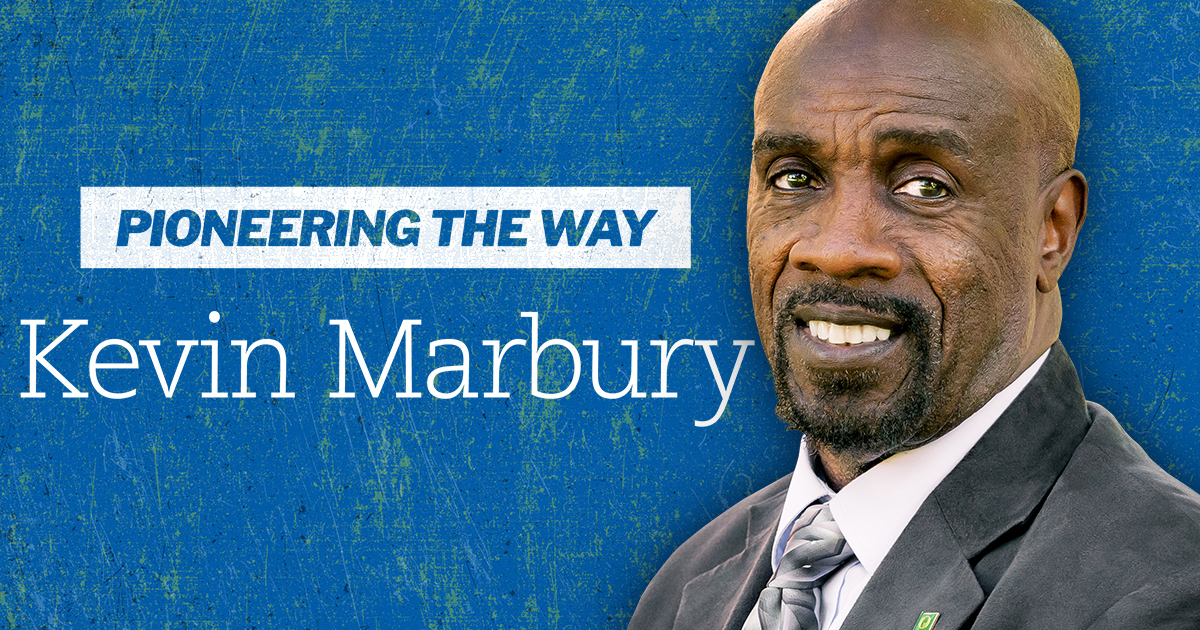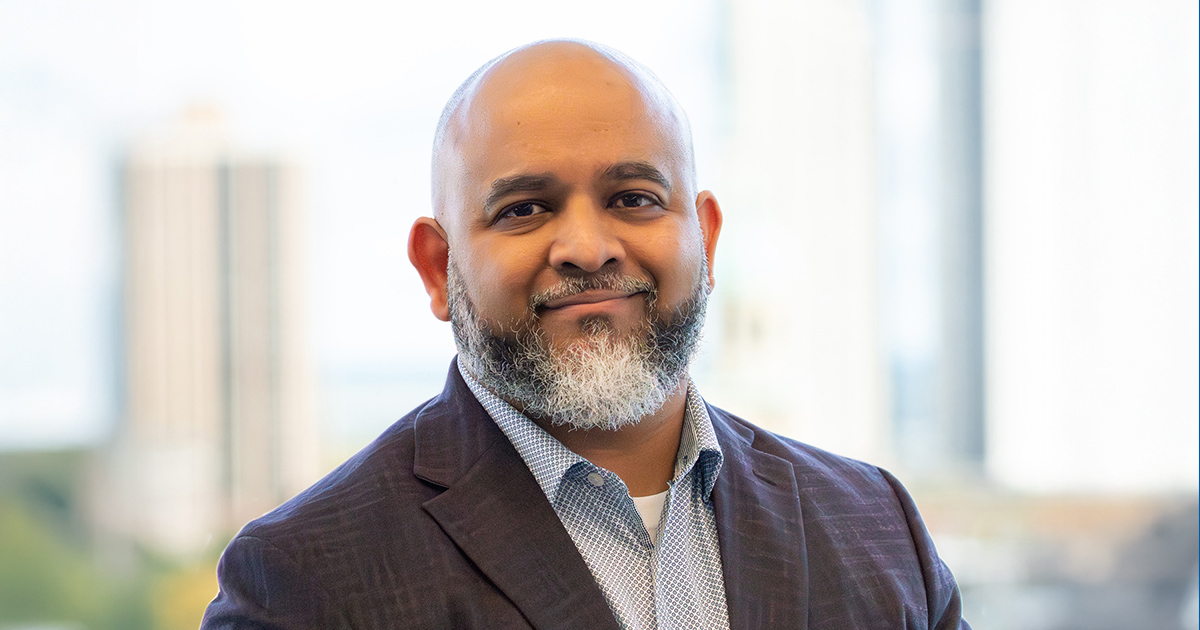“A life is not important except in the impact it has on other lives.” – Jackie Robinson
As NIRSA continues to celebrate the diverse culture of campus recreation professionals (through avenues like caucus discussions), we want to take a moment to explore some seminal figures who have trailblazed the way for Black professionals to make an impact within and beyond NIRSA. I took time recently to speak with six NIRSA pioneers about why and how they have taken steps into leadership with NIRSA.
A common theme among the group was a sense of responsibility to carry forward—with courage and servant hearts—the torch set in motion by the original 20 Black founders of NIA.
Over the coming weeks, I invite you to explore the leadership journey of past, present, and future black leaders in NIRSA through the lenses of these six pioneers:
- Jocelyn Hill, Director of Recreational Sports & Fitness at American University
- Kevin Marbury, Vice President of Student Life at the University of Oregon
- Jean McClellan Holt, Assistant Director of Recreation & Wellness at Old Dominion University
- Juliette Moore, Retired Director at the University of West Florida
- Stan Shingles, Assistant Vice President at Central Michigan University
- Mirum Washington-White, Director of Athletics, Curriculum Chair for Physical Education, Dept Faculty at St Cyril of Alexandria School (debuts February 8)
About Dr. R Kevin Marbury
Dr. R Kevin Marbury was appointed Vice President for Student Life at the University of Oregon on November 28, 2017 after serving as interim VP during 2016. Prior to his interim appointment, he was the UO’s Director of Physical Education and Recreation from 2012–2016. Kevin previously served as a vice president for student affairs at Edward Waters College in Jacksonville, Florida in 1997.
Kevin has a passion for mentoring students, campus recreation, and supporting students with wellness programs. During his professional career, Kevin has worked to support students in living active, balanced lives through opportunities such as PE classes, intramural sports, and the recently opened $50 million renovated and expanded Student Recreation Center—opened under Kevin’s leadership. He has a wealth of experience and leadership in recreational programming and was determined to make UO recreational programs and facilities a benchmark for universities across the country.
Kevin’s determination, hard work, and passion have played an important part in supporting Student Life goals and priorities. His leadership has positively influenced fellow staff and encouraged student development both personally and professionally.
Kevin’s pathway into NIRSA leadership
Kevin’s personal philosophy is that he’s a builder. He strives to make things better than he found them. His journey in NIRSA started with the mindset of networking and career development. As he began to explore resources, opportunities, and make connections in NIRSA, he was fortunate to be connected with Black mentors and peer leaders who inspired him on his journey. He credits their support when reflecting on his own efforts to contribute to NIRSA and grow professionally in higher education recreation.
Mentorship is a big part of the NIRSA experience, and many individuals were able to acknowledge Kevin’s abilities and help guide him to identify opportunities that would set him on a path to success.
One of his major contributions to NIRSA was serving in the role of NIRSA President in 2012, the culmination of a three-year term on the NIRSA Board of Directors. He mentions that the opportunity to stand for election to the NIRSA President role came around twice for him. The first time he was slated to stand for election was a warning of preparation. While his peers encouraged and supported him in his first opportunity, he held concerns that he needed more time to truly understand the responsibility of the role and how he could serve well if he was elected by the NIRSA membership.
He did not win the presidential position when he was first slated, giving him time to observe and prepare for when the opportunity would come again. The second time he stood for the position, he approached it with confidence, ready to take on the responsibility with a clear vision and plan.
He came into the role as a servant leader and with the mindset that he was interested in finding ways to best serve the NIRSA organization and the needs of its diverse members. This included identifying BIPOC individuals who could serve in influential roles in an effort to display a more accurate representation of the entire organization among leadership. He achieved this by being present and active at the annual People of Color Social, participating in Emerging Recreational Sports Leaders Conferences, and mentoring young Black leaders to help support them as they grew from bystander members to active and engaged volunteers.
Kevin mastered the art of “luck happens when preparation meets opportunity.” As he led, he realized that he was the model for younger professionals, and he wanted to serve in a way that set the right example. This conscious preparation and intentional action have granted him opportunities to be a part of conversations that influence change not just in the field of campus recreation but into student affairs and the overall student experience.
Kevin’s call to service
When asked what he hopes to see happen with NIRSA in light of his impact, he says, “I want NIRSA to be an organization that is not just viable but that flourished and serves its members the best way. For that to happen, the organization has to expand and hear more voices.”
Kevin continues with optimism: “Most people are being braver and are expecting more to have their voices be heard. We have gotten away from certain schools monopolizing a conversation. We are more inclusive. We must continue to create the environment that this is a place for everyone.”
Others understand and value what we do as collegiate recreation professionals and that reputation has come about because we have not gotten stuck or blocked others out. We have opened the door to allow others to come into the fold and learn through meaningful participation. Kevin recalls that when he first joined NIRSA the focus of professionals was primarily on sports. However, he witnessed how that focus grew and came to include fitness, wellness, facilities management, and student development. The focus became on healthy lifestyles for students post-graduation.
He adds, “I am old enough to remember when it was not realistic for professionals to transition from a home in athletics to a home in student affairs; but before we made the transition, people had to see that we have the skills to make it happen.” His philosophy: “Manage people, money, and places, then you can change things!”
Kevin acknowledges that the downside to moving up the ladder in leadership is missing opportunities to have as many personal connections with students. However, the leadership roles have awarded him the opportunity to model behaviors for young professionals who will soon be in the position that he is in now. He feels very fortunate to have others pour interest and advice into him, so now—through NIRSA and other service work—he pours his own experiences into others. Some of the mentorship opportunities he has are with his longtime NIRSA peers. They keep him connected, grounded, and current. He emphasizes that mentoring is a two-way street and the relationship has to be symbiotic.
Offering up a piece of encouragement to upcoming leaders, he says, “You will get advice and be pushed in many directions; but don’t let others define you. Figure out what you want to do and go for it. If your garden is feeding you and giving you what you need then keep it up. Don’t sell yourself short.”
Shine a spotlight on your mentor
NIRSA has a great history and the opportunity for a bright future. Our founders and the Black leaders who have come after them have set an example for all of us—they encourage us to actively engage and be the change we want to see on our campuses, in this profession, and within our association.
I’m proof that, as young professionals, we have the opportunity to connect directly with the leaders mentioned in this series.
If you are a leader in collegiate recreation or strive to be, then I invite you to be brave and use your voice. Reach out to me if you’re interested in contributing an article to honor a pioneering Black leader and inspire the next generation of NIRSA leadership.
We will not be an organization that repeats its past or gets stuck in its present. Instead, we will connect with our past and set course for our shared future with a mindset that everyone is welcome on the journey. The future is in you!
- For more information, contact Katherine Geter, Coordinator of Rec Sports & Family Programs for University of Houston’s Campus Recreation.
- If you are interested in highlighting your campus or a NIRSA member’s achievements on your campus, pitch us your ideas.
Katherine "Katie" Geter is currently Coordinator of Rec Sports & Family Programs for University of Houston’s Campus Recreation; you can email her at kgeter@central.uh.edu.







